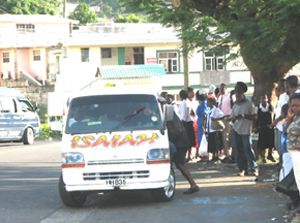STRANDED

From Fancy to Chateaubelair, the majority of the island’s 500 unionised minibus operators turned a deaf ear to pleas from Prime Minister Ralph Gonsalves and went on strike.
It was their second strike in four weeks but unlike the August 23 stoppage which was not well supported, Wednesday’s industrial action was felt in stores, supermarkets, government offices, and other business establishments.{{more}}
Some employees did not turn up for work while others begged, borrowed, or hitched rides.
One employer was peeved and took a tough position on absenteeism: “No work, no pay,” she told SEARCHLIGHT.
Taxis picked up the slack offering short haul rides for $1.50 per person while non-striking mini-buses did a bristling trade.
NOBA â the National Omni Buses Association â locked horns with government over its refusal to grant them fare increases.
The Ralph Gonsalves administration instead offered a subsidy to buffer the increases in diesel and gasoline. There were four price hikes since 1999 when bus fares were last increased.
Prime Minister Gonsalves also promised to examine a subsidy for tyres but ruled out any fare increase.
Commuters largely supported the action in sympathy. Forty-three per cent of commuter polled 24 hours before the strike solidly supported NOBAs call for a fare increase.
The Opposition National Democratic Party was also in NOBAs corner. Party leader Arnhim Eustace said that if government could give increases to the fuel companies and the power company then the minibus operators should be treated fairly and without disrespect and contempt which he charged characterised the negotiations.
Up to news time, Wednesday night, the Chamber of Commerce was locked behind closed door mediating the dispute.
It was their members which felt the brunt of the action with some reporting a drop in sales.









